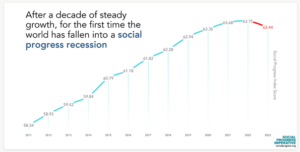
This year, more than half of the world’s population will vote in national elections: 86% of these electors live in a country with declining or stagnating social progress.
«After a decade of steady growth, for the first time, the world has fallen into a social progress recession», maintained the Social Progress Imperative in January, publishing its annual Social Progress Index. Released annually since 2012 by the American nonprofit, the Index is compiled with the data collected in 170 countries – those offering sufficient information on the 12 components in which the scores are calculated.

According to the most recent results, in a year, from 2022 to 2023, social progress has stagnated or declined, resulting in a drop in the overall score of 0.31 points. The major declines are recorded in Health (-1.7), linked to the consequences of the COVID-19 pandemic; access to Information & Communication (-2.2), due particularly to an overall decline in press freedom; and Rights and Voices (-0.51). This last area, especially, is troublesome due to the constant decrease registered in 13 years since the first Index: «Rights across the world have been on a long backwards slide since 2011 (-6.49), and this continues to be one of the biggest problems in advancing social progress», reads the most recent edition.
Compared to other similar methods of surveying the global situation, the Social Progress Index is built refraining completely from using GDP numbers, even without denying the strong and positive, albeit non-linear, relationship to social progress. But, as per findings, the Index maintains that «GDP per capita does not completely explain social progress. At lower income levels, small differences in GDP per capita are associated with large improvements in social progress. As countries reach high levels of income, however, this marginal effect diminishes/declines.»
The decline
A streak of years of steady, if slow, improvement in social progress has stopped. And even the countries or the regions that showed the best performances in the past ,cannot keep the overall trends on an upward, or at least flat, line. In one year, 10 of the 12 components reviewed have declined or stagnated. Only 34 nations showing any real progress, 74 stagnating and 62 recording in 2023 a significant decline. «If the world was a country, – confirm Social Progress Index – it would have a score of 63.44/100. It underperforms on seven out of 12 components. Nutrition & Medical Care, Water & Sanitation, Housing, Basic Education, Information & Communications, Environmental Quality, and Rights & Voice.»
Because of the significant differences among the nations and to offer a more balanced view, in compiling the 2024 rankings, the Social Progress Imperative divided the world into “Tiers”, corresponding to the social development status of each country in the last 13 years. The best-scoring is Denmark, followed by all the other four Nordic nations (Norway, Finland, Iceland and Sweden, in descending order.) Germany, which is in 10th position, ranks at the top among the G20 but has not seen any improvement.
Italy, which falls in the second tier, reached a score of 83.61, preceding Malta (both countries’ progress is stalled) and just after Spain (that, instead, has shown a decline in social development). Of all the EU countries, Romania is in the worst position, at 44th.
Notably, even in the first two groups of countries – which include most developed nations in the world – a big wealth gap persists. In a way, showing how looking at more traditional measures of income can mislead or even fail to render the actual social development of societies. To give some perspective, «The US has a 54,510.47 USD GDP per capita and is ranked 29th on the Social Progress Index. Yet, Portugal, with a significantly lower GDP per capita of 31,798.15 2, scores nearly 3 points higher on the Social Progress Index and ranks six places higher.»
Elections year
Politically, we are entering the “Voldemort of years. The annus horribilis. The Year that must not be named”, warned the political risk consultancy Eurasia Group in January, releasing its “Top Risks 2024”. Many places that will be going to the pools are currently living in some level of conflict or seeing their politics and diplomatic efforts at least touched by rising levels of fear and violence. According to the Group, even the US election will pose a threat to world stability (to quote the report: it “will be by far the most consequential for the world’s security, stability, and economic outlook.”)
With over four billion people called to vote, 2024 is indeed a crucial year. And to most, the conditions in which many of them will be held are worrisome. The continuous and rising tensions worldwide are accompanied by a clear backlash on acquired rights and freedom. And by growing threats to gender expression, freedom of speech, and rights for women and minorities. In this climate, the elected officials must address issues like declining general health, education, and access to safe and nutritious food and drinking water. It can also be the year businesses realize (further?) that they also have a role and can benefit from changing a deteriorating overall social progress.
As the Index suggests, «Businesses need to make decisions that not only account for their economic health, but which also ensure that economic progress does not come at the cost of the environment, or societal well-being.» Could understanding how people live, who has been left behind and how to accelerate or re-start the progress also benefit, in the end, the economy as a whole?
***
Alley Oop’s newsletter
Every Friday morning Alley Oop arrives in your inbox with news and stories. To sign up, click here.
If you want to write to or contact Alley Oop’s editorial team, email us at alleyoop@ilsole24ore.com.